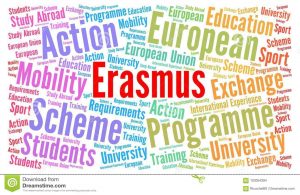Dr Erin Bell
On 31 January 2020 at 11pm, the UK left the EU, with a ‘transition period’ until the end of the year. The impact of Brexit since the 2016 Referendum has been significant in the lives of individual students and staff, not least because definitive information on the status of EU nationals has been hard to come by, and at times contradictory. The lack of solid information has impacted on us as a community – would colleagues leave the department for jobs in the EU? Would those with EU partners do the same? Would Lincoln students be put off the idea of study overseas as exchanges with EU institutions have meant access to a bursary? Would EU students no longer come to Lincoln, either for the full History degree, or on exchange? Would other international students be put off due to the uncertainty?
Whilst the loss of History staff on a large scale has not come to pass, we have certainly lost opportunities for our students. From 2015-18 I was involved in the first stage of an EU-funded project, E-Story (e-story.eu) which amongst other things staged an event at Lincoln for Lincoln and other students interested in postgraduate teacher training, and offered an overview of school history teaching across Europe. The project also enabled PGCE and undergrad students to attend training in Spain and Italy. Brexit means that although we could be part of the initial stage, the UK team will likely not be part of the second, scheduled for 2021-23. That means that work students could have done at the university and the East Midlands film archive, and Europe more widely, is unlikely to be possible.
More significantly, though, Lincoln students after the 20/21 academic year have lost the opportunity to study in EU countries without significant financial impact. That means students hoping to go on an exchange in 20/21 will, we hope, be able to access funding, but not in later years. Of course the International Opportunities team will continue to do fantastic work in encouraging students to spend a term overseas, but as members of the EU, British students could attend institutions in the EU through the Erasmus scheme (https://www.erasmusplus.org.uk/) and receive a bursary when doing so – not a huge amount of money but enough to cover a lot of the costs of accommodation and to enable students to consider a semester in the Czech Republic (https://www.upol.cz/en/), the Netherlands (https://www.ru.nl/english/), Germany (https://www.uni-mainz.de/eng/) or Belgium (https://www.ugent.be/en). In future these links will continue, much as we have links with institutions in the USA and Canada, and students in some economic circumstances are currently (19/20) able to apply for travel costs – International Opportunities offer guidance. However, as the Erasmus representative in History for several years I am aware of how for some students the bursary really does make a difference and I fear that some students will not feel they can risk the financial outlay if there’s no bursary at all.
We have also seen a decline in the number of EU students coming to History, especially in the academic year 19/20 – this may be for reasons other than the uncertainties experienced in the same year regarding Brexit, but it seems likely that they formed part of the notable absence this year of Czech, German and Dutch students in History lectures. Students from outside the EU, particularly this semester from North America, continue to arrive into the College in fairly large numbers and will continue to energise the student cohort here, bringing fresh ideas and insights from other institutions and other nations. If we can recoup the EU students coming to Lincoln – much depends on deals struck in the coming months – the diversity of visiting students will return to its previous level, to the benefit of all. So much is out of our control – international politics; accounts of Brexit circulated overseas that may counsel overseas students not to travel here (see https://www.theguardian.com/education/2020/jan/28/too-much-risk-why-erasmus-students-are-shunning-brexit-britain); the process of withdrawal – that we can only hope Lincoln continues to be a desirable destination for a wide range of students on exchange.
I know that Lincoln students will continue to choose to study abroad, will take opportunities offered to them to do so, and will meet a lot of interesting people whilst doing so. But I am immensely saddened that this will not be as part of an internationally organised body. We may also see fewer students from poorer backgrounds able to do so. I am also saddened that it will very likely be more difficult for Lincoln staff to be engaged in EU-funded research, much of which also offered opportunities for Lincoln students. Other research will offer similar opportunities, but the range will necessarily be narrower if an entire funder is removed. Nothing will change after Brexit, but everything will change. Students can still study abroad, but not in the same way, whilst colleagues will still be engaged in research, but not with as wide a range of potential collaborators. It is the work of International Opportunities and the university overall to support students – and staff – in gaining access to these opportunities, even when, and in part because, it has become more difficult to do so.
